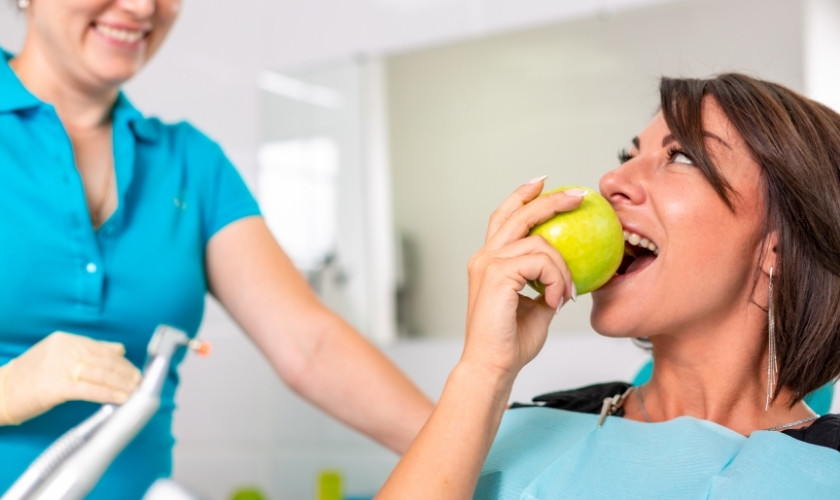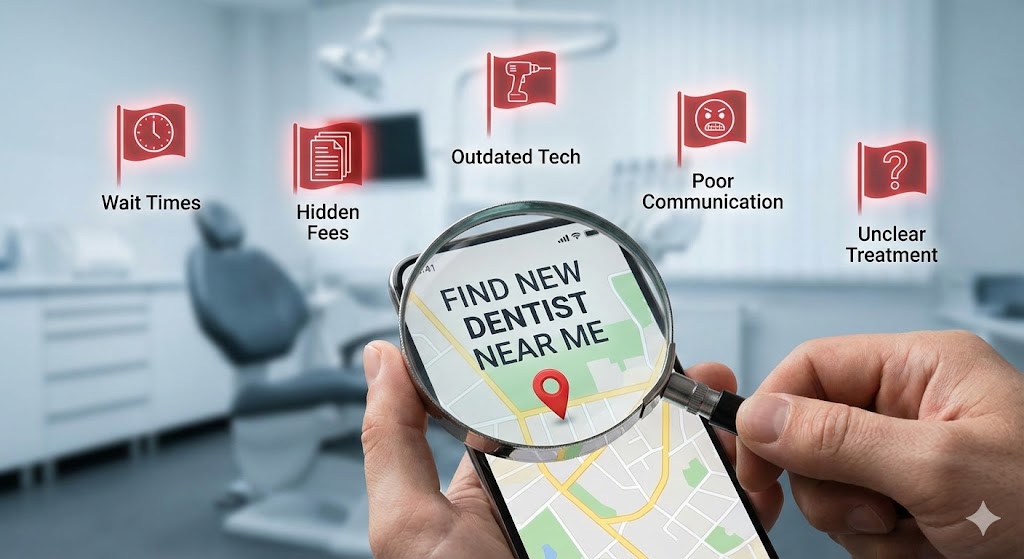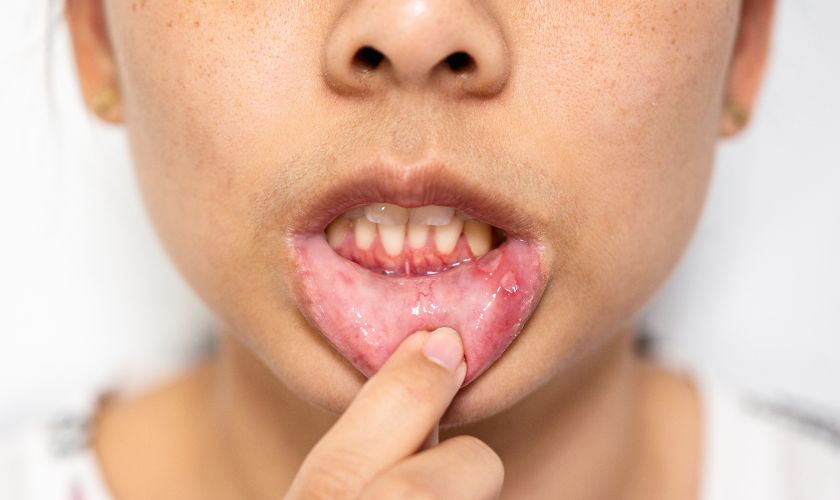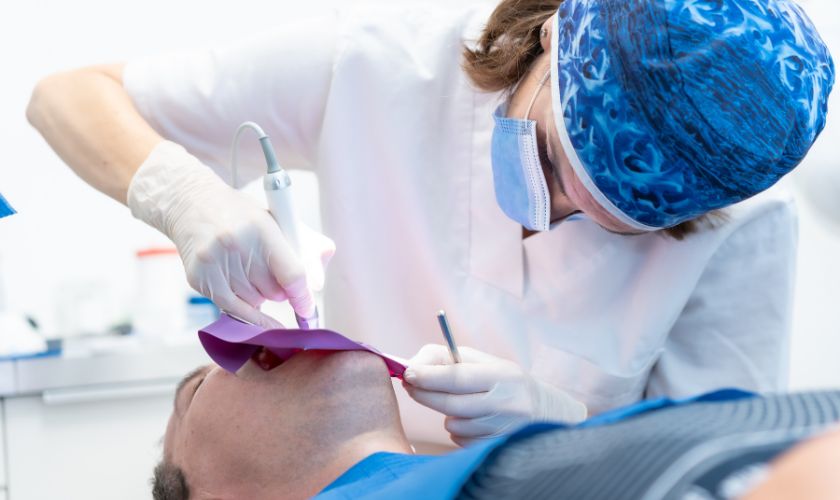$29 Emergency Exam - Walk-Ins Welcome - Same-Day Dental Appointments Available

Have you ever taken a bite of something delicious, only to stop mid-chew because your tooth hurts? That sharp, unexpected pain can catch anyone off guard. You may wonder, Why does my tooth hurt when I bite down?
The truth is, there are several possible causes—some more serious than others. Sometimes, the pain comes from biting something hard; other times, it could be a cracked tooth.
In this guide, we’ll explore the top reasons behind this tooth pain and what you can do about it. If you’ve been thinking, My teeth hurt when I bite down, this blog is for you.
Why Does My Tooth Hurt When I Bite Down? Decoding The Main Reasons
There may be many reasons why teeth hurt when one bites down. Let’s develop a clear understanding of these reasons.
1. Cracked Tooth – A Hidden Threat
One of the most common reasons for tooth pain when biting down is a cracked tooth. Cracks can be hard to see with the naked eye, but they often cause sharp pain when you chew or apply pressure. These cracks may happen suddenly, especially if you’ve bitten down on something hard, or they can develop slowly over time.
Symptoms of a cracked tooth include:
- Sharp pain while chewing
- Sensitivity to cold or hot foods
- Pain that comes and goes
If you’ve had tooth pain after biting a hard object, you might have caused a fracture. This pain won’t go away on its own and may worsen without treatment.
2. Tooth Decay – Often Silent, Then Suddenly Painful
Tooth decay can go unnoticed for a long time. However, once it reaches the deeper layers of your tooth, it can cause intense pain when pressure is applied. This may be the reason behind your recurring thought: Why does my tooth hurt when I bite?
Signs of decay-related pain:
- Dull ache or sharp pain when chewing
- Visible holes or dark spots
- Pain that lingers after eating
What to do:
- Brush and floss regularly to prevent further decay
- Use fluoride toothpaste
- Book a dental checkup before the damage spreads
3. Biting On Hard Objects – Unexpected Damage
Have you recently bitten into a bone, seed, or something unexpectedly hard? You might be dealing with trauma to the tooth or the surrounding ligament. Many people experience tooth pain after biting a hard object, which often results in inflammation or even microscopic fractures.
4. Worn Or Damaged Fillings And Crowns
Old or poorly fitted dental work can cause tooth pain when biting down. Fillings and dental crowns may crack, shift, or wear out over time, exposing the tooth. This can make your bite feel off or trigger pain when chewing or drinking hot or cold liquids.
If you notice discomfort in a tooth with a crown or filling, avoid chewing on that side and book a dental visit. A simple adjustment or replacement can relieve the pressure and protect your tooth.
5. Gum Infections Or Dental Abscesses
The tooth itself doesn’t always cause tooth pain when biting down—sometimes the issue starts in the gums or deep at the root. Infections like gum disease or dental abscesses can trigger intense pressure pain, swelling, and even a bad taste in your mouth.
If your face feels puffy near a sore tooth or you notice a persistent throbbing paired with bad breath, there’s a good chance an infection is brewing below the surface. Some people even develop a fever.
Don’t wait it out—these infections don’t heal independently. Rinsing with warm salt water might offer mild relief, but only a dentist can properly clean the area, stop the infection, and prevent it from spreading further.
6. Teeth Grinding Or Clenching (Bruxism)
If you clench or grind your teeth—especially at night—you may feel pain when you bite down, even if there’s no decay or crack. The constant pressure wears down enamel, strains the jaw, and inflames the tooth’s roots.
Symptoms of bruxism include:
- Morning headaches or jaw pain
- Flattened or worn teeth
- Tooth sore when biting down
What to do:
- Wear a nightguard while sleeping
- Reduce caffeine and stress
- Practice jaw relaxation techniques
7. Sinus Pressure – Surprising But Real
If the pain is isolated to your upper back teeth, your sinuses might be the problem. Sinus inflammation puts pressure on the roots of those teeth, causing discomfort when biting down.
How to know it’s sinus-related:
- You also have nasal congestion or sinus pressure
- Multiple teeth hurt at once
- Pain worsens with movement or when bending over
When Should You Worry About Tooth Pain?
It’s easy to assume the pain will pass, but when it lingers or intensifies, don’t ignore it. If you’re still asking, “Why does my tooth hurt when I bite down?” days after the pain began, it’s time to take action.
See your dentist if:
- The pain persists for more than 2 days
- You notice swelling, redness, or discharge
- You feel a “loose” sensation in the tooth.
- You’re experiencing difficulty chewing or sleeping
Getting a proper diagnosis can prevent the issue from turning into a more complicated (and costly) problem.
Practical Tips To Prevent Future Pain
Keeping your teeth healthy starts with consistency. Here are some steps you can take at home to prevent tooth pain when biting down in the future:
- Brush twice a day with fluoride toothpaste.
- Floss daily to clean between teeth.
- Avoid chewing ice, pens, or hard candy.
- Visit your dentist twice a year for exams and cleanings.
- Address minor discomfort before it becomes significant pain.
Your teeth are strong, but they aren’t invincible. Preventive care is your best defense against future pain.
Tooth pain when biting down isn’t something to brush off. Whether it’s a cracked tooth, worn-out filling, gum infection, or simply clenching from stress, that soreness is a sign your tooth needs attention.
If you say, “My tooth hurts when I bite down,” or “My teeth hurt when I bite down, and I don’t know why,” trust that your body sends a message. The good news? Most of these issues are treatable, especially when caught early.
Taking action now can save you from more significant dental problems in the future. If you’re tired of the pain and ready to get to the root of the problem, schedule an appointment with your local dentist and take the first step toward relief.




